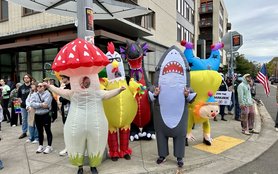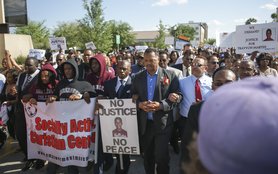My rural Southern upbringing and the challenges faced by Black communities fuel my commitment to public policy, particularly in advocating for environmental justice and food security.
My childhood home sits in what used to be a corn field in South Carolina. Simpsonville, SC summers as a child were spent riding around on the back of a golfcart or four-wheeler with my cousins and grandparents helping feed the chickens or checking on the heifers in the back pasture. I wasn’t naive to the fact that most people didn't have the experience of growing up like my families did but it wasn't until my cousins and I were sitting on my grandmother’s porch, passing around a water hose to clean our feet that I overheard my older cousin labeling our family as “countr-hetto”, a combination of the identity's country and ghetto. I brushed the comment off then but now I recognize her combining those descriptors would shape the woman I have become and the work I do.
In educational and policy spaces, I often heard that I had the potential to be so much more than my small town. I found myself vying to become a pediatrician or dentist, what I deemed as “respectable” career choices and the opposite of what I saw and experienced as a child. I attended my undergraduate institution and did well in many of my health theory courses but quickly realized organic chemistry was not my strong suit, earning the only F I have received in my academic career. I was devastated. I had always relied on my intelligence and drive as my way to remove myself from peri-rural South Carolina. I could not dwell in my disappointment for long however, I had to maintain the scholarships that were allowing me to attend college, so I quickly regrouped and strategized my next steps. After researching health career paths, I decided to finish my degree in public health immediately after the COVID-19 pandemic began. I was a new public health student actively learning about health protocols and programs while seeing disparities between those who had access to aid versus those who did not, with an emphasis on many disadvantaged Black and rural communities. I recognized one of the largest barriers to access aid was in the food space. Many Black families found themselves not only fighting for their safety during a pandemic, their freedom and rights during the police brutality protest of 2020, but hunger at home due to food deserts. All of these compounding woes highlighted the inadequate policy choices and lack of economic mobility Black Americans had been organizing around. I took the remainder of my collegiate career to understand the linkages between systemic oppression and our food system in the United States. Food is one of the largest upstream determinants of health , as access to whole food options is often limited by location and economic stability. I witnessed this phenomenon in real time in my peri-rural black community.
Understanding more education was needed but recognizing I needed a break from post-pandemic burnout, I took a post with an Americorp VISTA program. Starting July 2022, I created a basic needs resource center providing food, clothing, school supplies, housewares, and technical assistance for government and state aid at my alma mater, the University of South Carolina. One of the first of its kind serving students, faculty and staff, the service-learning program generated funding from university donors and corporate responsibility partners such as Food Lion Feeds and Feeding America. I was able to create volunteer and experiential learning opportunities for over 300 students to serve their collegiate community through the resource hub. The Gamecock CommUnity Shop is now recognized in the White House Challenge to End Hunger and Build Healthy Communities as a model that can be replicated at higher education intuitions nationwide. In this venture, I gained a deep understanding of the power of policy, particularly in food systems and mutual aid. With this focused effort on food security and sovereignty, I decided to apply for Duke University Sanford School of Public Policy Master’s in Public Policy, a top 5 public policy program in the country.
Graduate school has helped me to connect the dots. Government decisions have impacted the levels of access and wealth communities have today. It’s all around us. 56 percent of our nations Black population lives in the American South and these individuals are experiencing extreme weather, increased temperatures, and flooding that will impact human health, infrastructure, and agriculture. Environmental justice, rooted in people-centered public policy, prioritizes the equitable distribution of environmental benefits and burdens across all communities, especially those historically marginalized. It emphasizes the inclusion of these communities in decision-making processes, advocating for policies that address systemic inequalities and promote sustainable development. Contextualizing all of this during my first year of graduate schooling led me an environmental justice internship with Oxfam. By centering the needs and voices of those directly impacted, environmental advocates aims to create a more equitable and inclusive framework for environmental protection and public health. The prioritization of this work by the US Domestic Policy team is platformed across departments and teams through it’s environmental justice centered newsletter, “The Good News”. The newsletter offers partner organizations and communities a centeralized place to receive information about upcoming grants, technical assistance and spotlighting organizations doing the work across Louisiana, Mississippi, North Carolina and Georgia. Access to information is one of the most powerful tools advocates have available and is a mechanism that has been gatekeep across race, gender, socioeconomic status and location.
The American South has a rich and well documentedhistory surrounding descendants of people that were enslaved from the era of Reconstruction to modern day America. Sherman’s Special Field Orders No.15 granted forty acres and a mule to hundreds of Black Americans with the intent to utilize their sharecropping skills to provide for their families following the civil war. 40 acres and a lie, a three-part podcast from the Center for Public Integrity, shares personal anecdotes of the families across the southeast who received the land promised until it was revoked by the United States government and returned to their enslavers. Today, there are less than 2% of Black farmers and their families with land that is used from agricultural needs compared to the 14% in 1910. This loss of land can be directly correlated with the financial depletion of Black farmers due to agricultural policies that platform large-scale agribusiness. Generational land and wealth loss stems from the USDA’s discriminatory practices. In 2022, only 36% of Black farmers were granted access to direct USDA loans and 16% were rejected, the highest in any demographic group loans. Compared to their white counterparts, of which 72% of those who applied and were approved and only 4% denied. With most Black farmers averaging 61 years of age, there must be infrastructure improvement to support youth and young adult Black farmers as they work to improve the industry many have convinced themselves will never change. Legislative initiatives and supplemental programs like Justice40, the Biden-Harris administration promise that 40 percent of environment and energy benefits will be focused on disadvantaged communities that are overburdened by pollution and underinvestment. The initiative is only the beginning of the aid needed to minimize air pollution that is raising asthma rates in Cancer Alley, eradicate the lead water crisis still occurring in Flint and elsewhere, permanently stop the building of LNG plants on the Gulf Coast of Mississippi and Louisiana and every other environmental crisis occurring in Black communities nationwide.
In this moment where what it means to be Black, country and southern has been on the rise in recent years I am reminded of my cousin calling me “countr-hetto”. With Beyonce’s Cowboy Carter, Shaboozy’s rise to fandom, and cowboy boots sales at an all-time high, we must remember it is not a phase for many Black Americans living in rural areas and/or the south. Black Americans are receiving the brunt of the evils from environmental racism, and they deserve to be platformed for their intellect and experience as much as the aesthetic they provide.
Environmental Justice is a tool of democracy, arguably the one that most reaches across the aisle and affects people of all ages, socioeconomic status, class, gender, race and ethnicity. Environmental justice advocates are needed in the halls of Congress, on our school boards, cooking in Michelin star restaurants, and planting crops like their ancestors. I ran away from my calling for years, not thinking there was much impact to be made in the farming and agricultural spaces to now learning how to advocate and secure funding for Black farmers and environmental justice organizations nationwide. Much like a field of crops, I had to be tended until I recognized I must bloom where I was planted.



